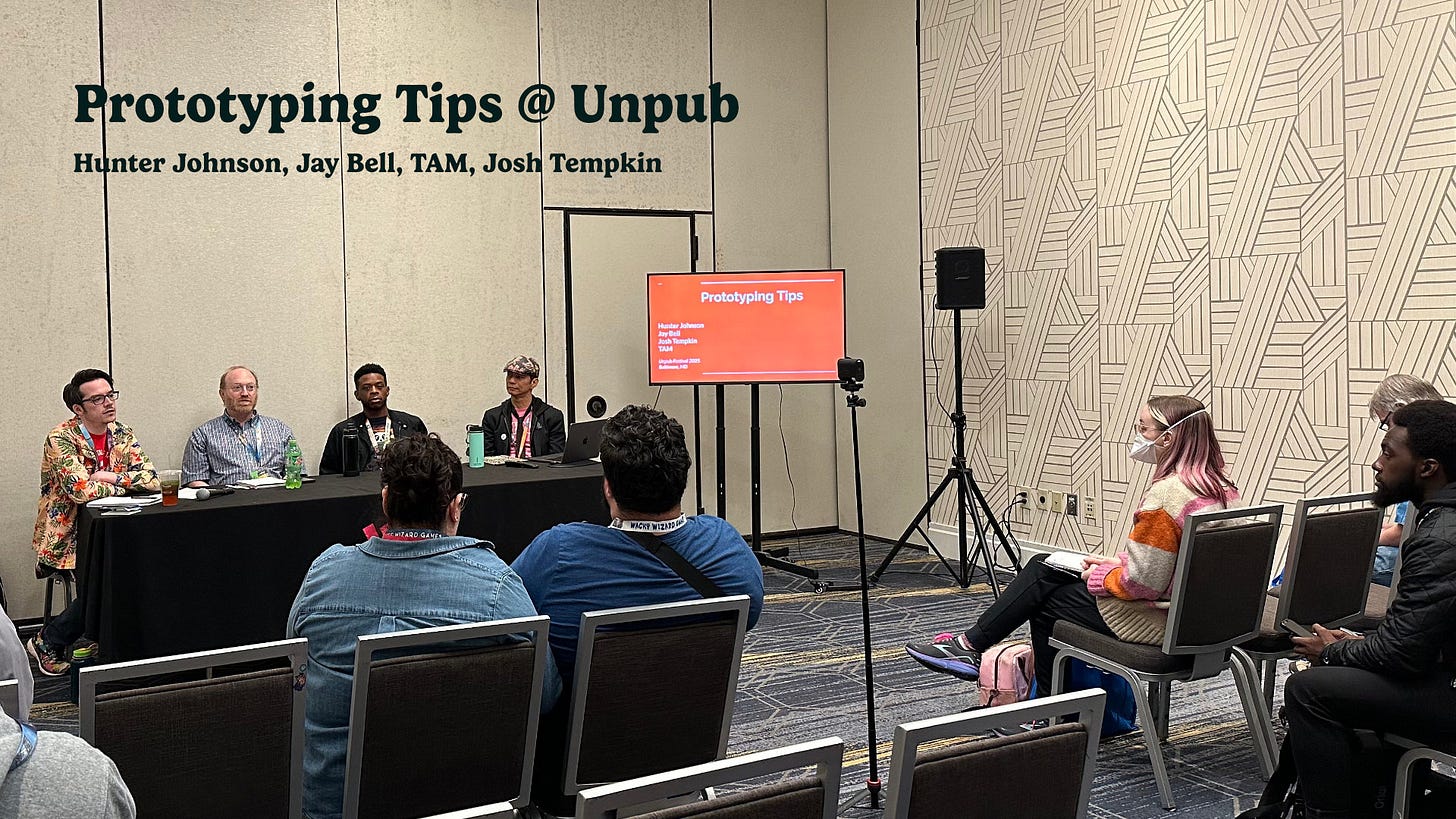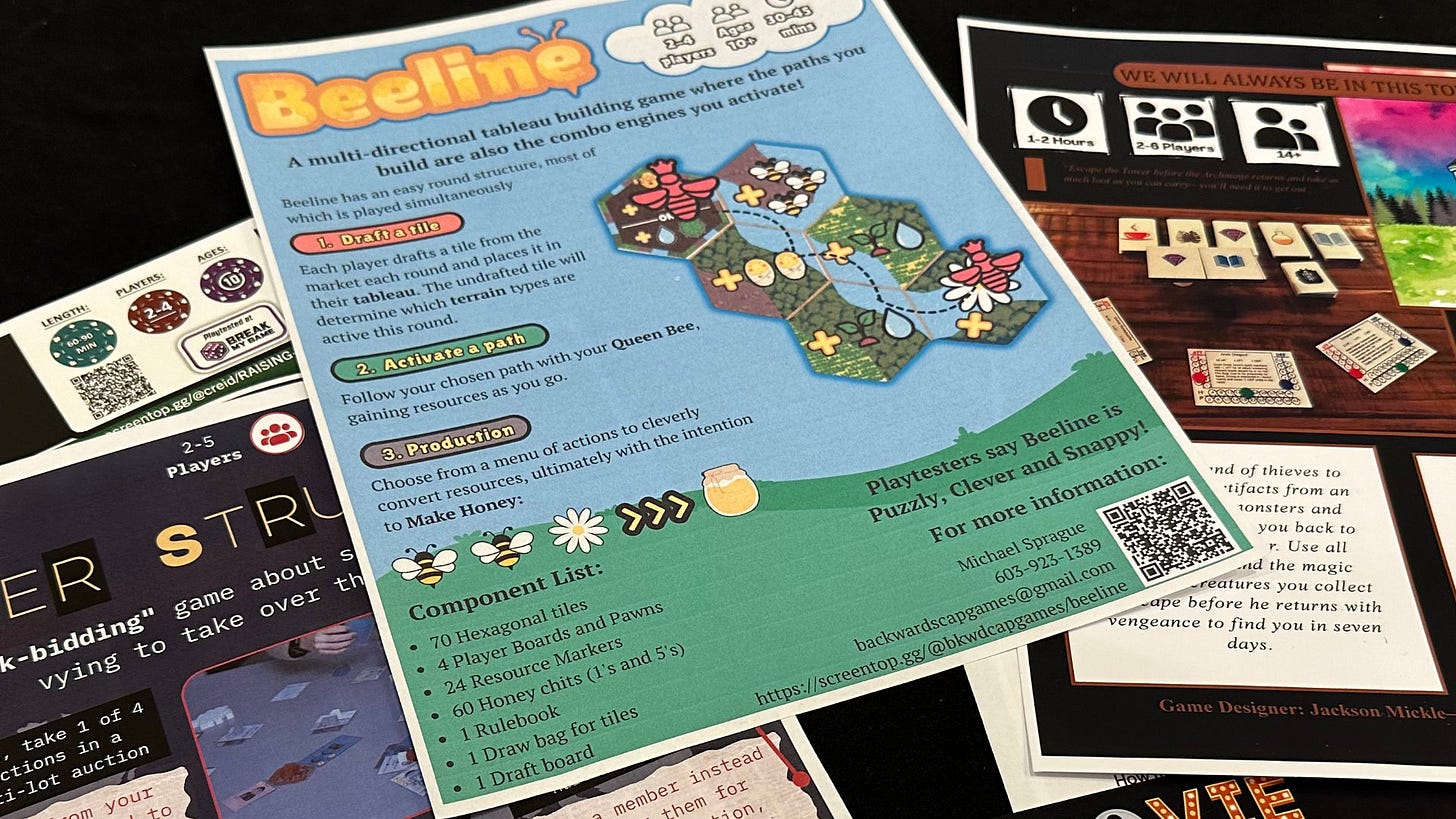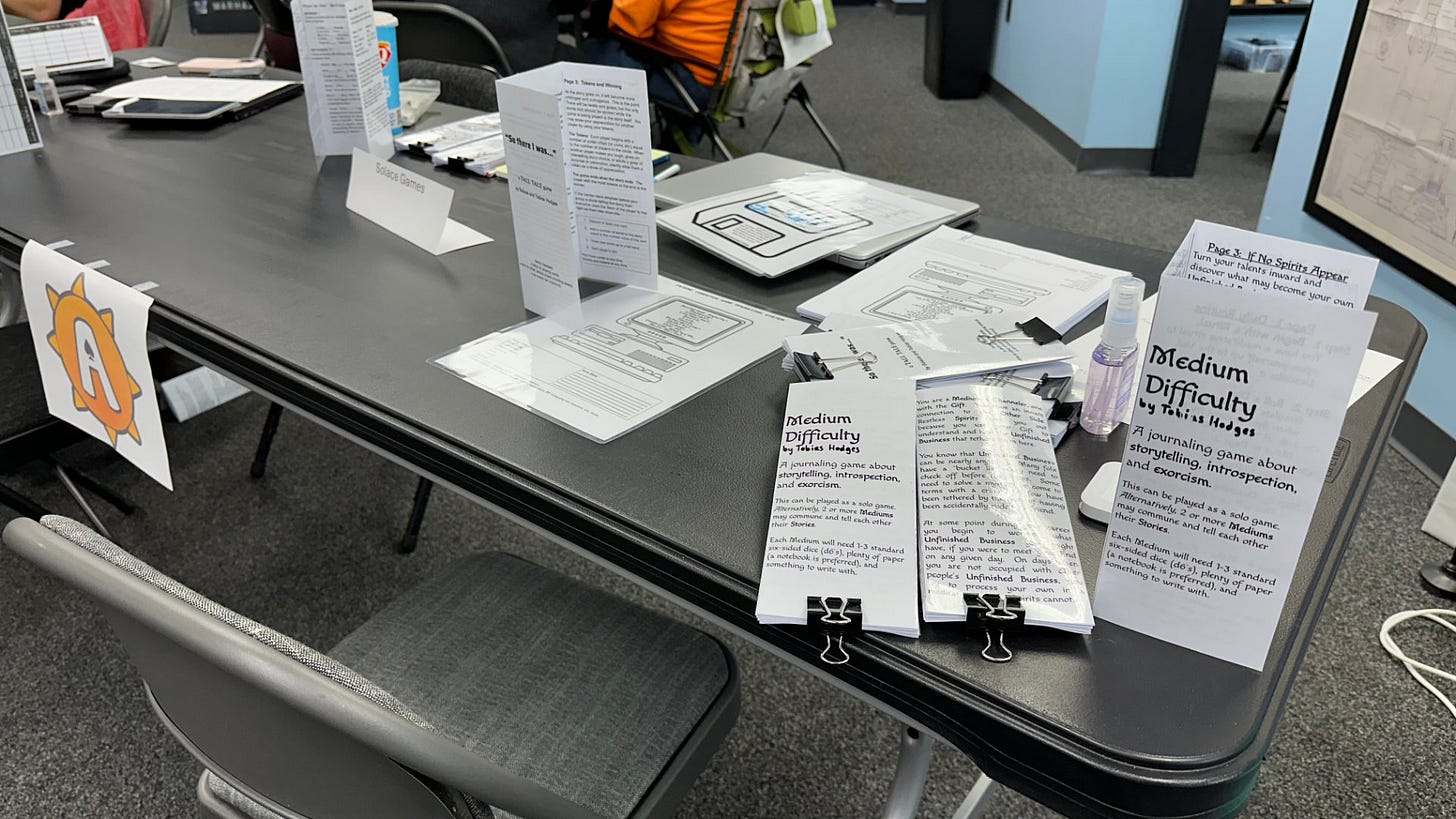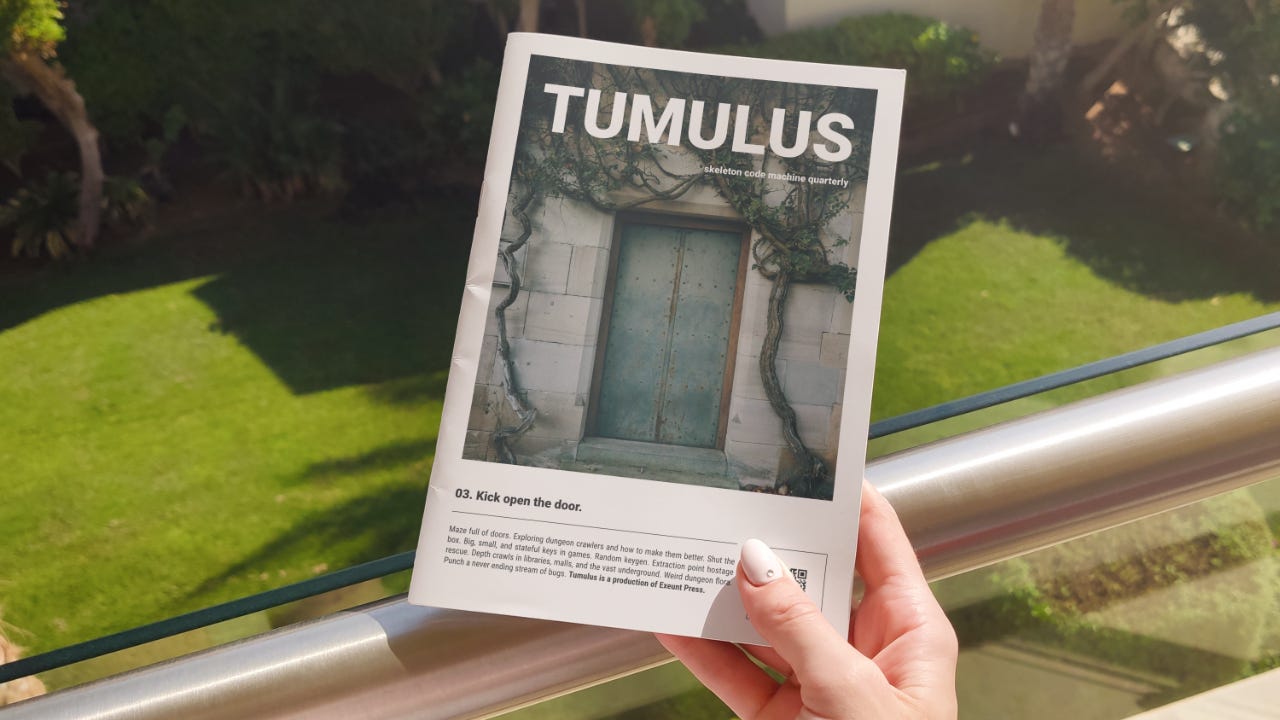Week 4: Public library TTRPG class conclusion
The Make Your Own One-Page RPG class comes to a conclusion with prototyping, playtesting, and pitching. Also, TUMULUS 03. "Kick open the door" is shipping now!
TL;DR Summary
👨🏫 Week 4: Library TTRPG class conclusion
🩻 Tumulus 3 is shipping now!
👨🏫 Week 4: Library TTRPG class conclusion
I’ve been teaching a Make Your Own One-Page TTRPG class at my local public library and doing a quick write-up for each session. You can read the previous ones here:
Week 2: How and why we play games
Week 3: Design, layout, and publishing
In Week 4, we learned about prototyping, pitching, playtesting — three topics that are important even if you never plan to sell your game.
Part 1: Prototyping
I based most of my comments on prototyping on what I learned at the Prototyping Tips panel at Unpub presented by Hunter Johnson, Jay Bell, TAM, and Josh Tempkin:
Prototype as early as you can.
Focus on making a Minimal Viable Product (MVP)
Get your core game loop working and test it.
Remove barriers to iterative design.
Don’t laminate too early and leave blank space for changes.
I also shared that you should see how the dice rolls feel, using the story of how I put so much work into Ratsail… only to find that it had excessive dice rolling that just wasn’t fun. It forced me to rework the entire project — a task that could have been avoided with earlier physical playtesting.
Part 2: Playtesting
After covering the three stages of playtesting (Internal, Local, Unguided), we went over what questions to ask when someone tries your game. This includes:
Do you think other players would be confused or unsure about what they should do when playing?
What was your favorite part of the game?
How would you describe this game to your friends?
We did a little activity called “Fix the questions!” where we rolled 1d20 on a list of potentially broken or suboptimal playtesting questions (“Was it fun?” or “Should I change anything?”). We then took a few minutes to consider:
Why is this question suboptimal or broken?
What is the question actually trying to ask or determine? What’s the goal?
How would you change/rephrase the question to make it better?
It was a fun exercise that generated quite a bit of really good discussion about what to ask and what not to ask.
Part 3: Pitching
Attending Feedback Frenzy at Unpub had a large impact on how I think about games and how we communicate about games. Using how to pitch your game at Unpub as a guide, we talked about sell sheets and more:
Lead with the basics (not a long discussion of lore).
Be up front about touchstones and inspirations.
Have a clear hook.
Know who the game is for!
Then we created pitches for our games as an activity. I created a worksheet with spots for the core parts of a pitch: title, one sentence pitch, number of players, duration, inspirations, target player type, and narrative hook. We then inserted these into a Mad Libs style pitch:
[Game Name] is a [Hook] game for [Min] to [Max] players. It plays in about [Duration]. Inspired by [Touchstone] and [Touchstone], in the game you are a [Narrative Hook] who is [Narrative Goal/Motivation]. People who like [Similar Game] will love this game.
This activity went extremely well! Everyone was able to quickly create a short pitch for their game and share it with the rest of the class. I think it really helped to alleviate the nerves and anxiety that can arise when speaking to a group about your new creation. It was so exciting to hear about what everyone had made!
You can try the games!
I made a mini unlisted game jam for the class, allowing participants to submit their games. You can check them out at the One-Page Library Jam.
How you can help: It would be really exciting for the creators if you try their game, leave a review, and maybe a rating. This is their first time making games, so any feedback is exciting!
I’m also excited to announce that a few of the creators in the class not only made their first games, but sold them at the recent local developer day at Lazarus Games! This really made the class seem worthwhile, not because of the sale… but because attendees went from zero to published game in just four sessions. They created something new, wonderful, and something they were proud to share with the gaming community.
I can’t think of a better conclusion to the class than that.
Make your own one-page RPG
If you aren’t able to attend the class, you can still get almost all the information and exercises! Make Your Own One-Page RPG is available in both print and digital formats.
Teach your own class!
If you already have experience making games, I ask you to consider volunteering at your local public library. The Make Your Own One-Page RPG guide is structured in a way to make it easy to teach, including exercises at the end of each chapter. It’s what I used for the class, and it was highly successful.
After you confirm the class with your library, I’m happy to help by answering questions you might have. Depending on availability, I can also do a quick Discord call to share ideas about the class and logistics. It’s one more way game designers can support public libraries!
Also, the ALA International Games Month will be in November — a perfect time to run your class! Exeunt Press is a gold level sponsor for the first time this year!
MAKE: You can get both ADVENTURE! Make Your Own TTRPG Adventure and Make Your own One-Page RPG at the Exeunt Press Shop!
🩻 Tumulus 3 is shipping now!
I started Tumulus last year — a print-only quarterly companion for the ENNIE-nominated Skeleton Code Machine newsletter. Now with about 150 subscribers, it’s one of the most exciting projects at Exeunt Press. This issue is no exception:
Jesse Ross (Trophy, Girl Underground) contributed Shut the Box, adapting a traditional pub game for use in TTRPGs.
Hinokodo (MIRU, Pondus) created Bug Hunt, a domino game about punching a never ending stream of bugs while stuck inside a room.
Weird dungeon flora art by Evlyn Moreau.
Designing interesting locks and obstacles using big, small, and stateful keys.
A hostage rescue game (incomplete by design) based on the Carta SRD.
Design exercises included with most pieces.
Skeleton Code Machine “best of” articles about dungeon crawls and depth crawls.
Start your subscription before August 31, 2025 to get this issue as your first of four.
Available as a subscription at a discount or back issues at full price, I think I’ve created something special. Unlike most magazines or periodicals that quickly become dated, the creative inspiration in Tumulus has no expiration date. In a world where many things are digital and ephemeral, I hope each issue earns a permanent place on your shelf — something to reference and re-read for years to come.
SUBSCRIBE: Tumulus from Skeleton Code Machine
Thanks for subscribing to Exeunt Omnes!
Check out games.exeunt.press for all the latest games and resources!
- E.P. 💀









This is so dang exciting!